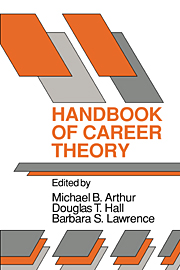Book contents
- Frontmatter
- Contents
- List of contributors
- Preface
- PART I CURRENT APPROACHES TO THE STUDY OF CAREERS
- Introduction to Part I
- 1 Generating new directions in career theory: the case for a transdisciplinary approach
- 2 Trait-factor theories: traditional cornerstone of career theory
- 3 Careers, identities, and institutions: the legacy of the Chicago School of Sociology
- 4 The utility of adult development theory in understanding career adjustment process
- 5 Developmental views of careers in organizations
- 6 Exploring women's development: implications for career theory, practice, and research
- 7 The influence of race on career dynamics: theory and research on minority career experiences
- 8 Asynchronism in dual-career and family linkages
- 9 Transitions, work histories, and careers
- 10 Career system profiles and strategic staffing
- PART II NEW IDEAS FOR THE STUDY OF CAREERS
- PART III FUTURE DIRECTIONS FOR THE DEVELOPMENT OF CAREER THEORY
- Name index
- Subject index
Introduction to Part I
Published online by Cambridge University Press: 05 June 2012
- Frontmatter
- Contents
- List of contributors
- Preface
- PART I CURRENT APPROACHES TO THE STUDY OF CAREERS
- Introduction to Part I
- 1 Generating new directions in career theory: the case for a transdisciplinary approach
- 2 Trait-factor theories: traditional cornerstone of career theory
- 3 Careers, identities, and institutions: the legacy of the Chicago School of Sociology
- 4 The utility of adult development theory in understanding career adjustment process
- 5 Developmental views of careers in organizations
- 6 Exploring women's development: implications for career theory, practice, and research
- 7 The influence of race on career dynamics: theory and research on minority career experiences
- 8 Asynchronism in dual-career and family linkages
- 9 Transitions, work histories, and careers
- 10 Career system profiles and strategic staffing
- PART II NEW IDEAS FOR THE STUDY OF CAREERS
- PART III FUTURE DIRECTIONS FOR THE DEVELOPMENT OF CAREER THEORY
- Name index
- Subject index
Summary
Our Preface offers some general comments about the way career theory has evolved. Now it is time to get down to specifics and consider the various theoretical approaches to careers extant in the literature today. In Part I we review the current “state of the art” of career theory, based upon the major lines of inquiry that have thus far emerged. Underlying all Part I chapters is a belief that before we can add to the theoretical landscape about careers, we must first have a good sense for its present contours.
To set the scene for the review that follows, a preliminary chapter by Arthur, Hall, and Lawrence explores how the diversity of theoretical perspectives that share the career concept can be brought together to promote cross-fertilization and new career theory development. First, the authors discuss definitions of career and career theory, the range of social science perspectives relevant to career studies, and the characteristics that guide career theory to highlight how career theory can serve as a nexus for transdisciplinary study. They then move on to consider how new career theory develops, by describing a cycle of new theory generation and mapping out the mix of philosophies of knowledge that career theory reflects. The authors conclude, and extend the thesis of the handbook, by claiming that debate at both these levels of analysis can promote “transformational” career theory that gains new relevance in a changing world.
Each subsequent chapter takes responsibility for an established perspective in career theory and covers both the historical emergence and the current relevance of that particular stream of thought.
- Type
- Chapter
- Information
- Handbook of Career Theory , pp. 3 - 6Publisher: Cambridge University PressPrint publication year: 1989
- 1
- Cited by



